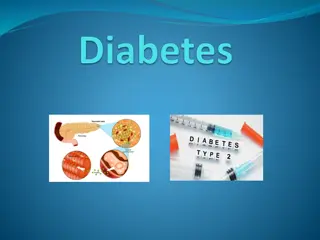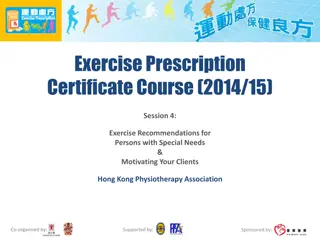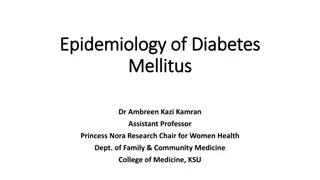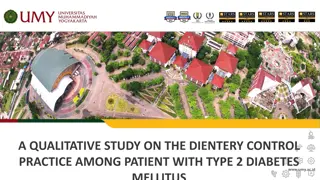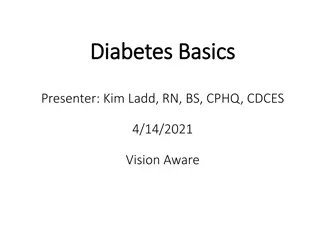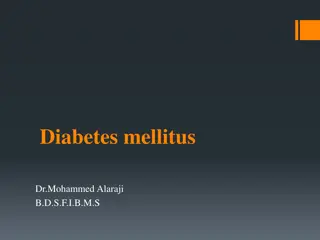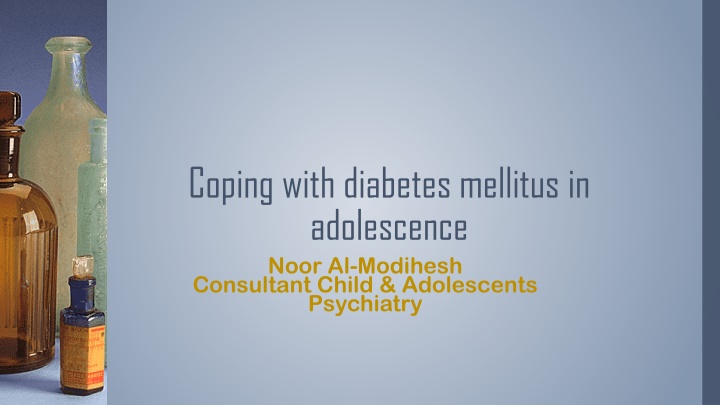
Coping with Diabetes Mellitus in Adolescence: Challenges and Strategies
Adolescence can be a challenging period, especially for adolescents with diabetes mellitus. This article discusses the difficulties faced by adolescents with type 1 diabetes, sources of stress, coping mechanisms, and ways to provide support. It also covers the different types of diabetes, psychological factors influencing diabetes management, and the prevalence of psychological morbidity in adolescents with chronic illnesses like diabetes.
Download Presentation

Please find below an Image/Link to download the presentation.
The content on the website is provided AS IS for your information and personal use only. It may not be sold, licensed, or shared on other websites without obtaining consent from the author. If you encounter any issues during the download, it is possible that the publisher has removed the file from their server.
You are allowed to download the files provided on this website for personal or commercial use, subject to the condition that they are used lawfully. All files are the property of their respective owners.
The content on the website is provided AS IS for your information and personal use only. It may not be sold, licensed, or shared on other websites without obtaining consent from the author.
E N D
Presentation Transcript
Coping with diabetes mellitus in adolescence Noor Al-Modihesh Consultant Child & Adolescents Psychiatry
Lecture outline Difficulties among adolescent with DM type 1 Sources of stressors for them. Types of coping. How to help.
Types of diabetes : IDDM-------5-10% Childhood NIDDM-------- 8.5% Age? Early adolescence (11-14 yrs.) Mid-adolescence (14-16 yrs.) Late adolescence (17-older yrs.) Am I normal Independence self image Future oriented intimacy career goals
Why they dont ask for help ? Dependent Behavior Parental involvement Immaturity Lack of support systems Severe illness or disability Psychopathology
Adolescence can be a difficult period of life. The need to become more independent, to create an identity and to adopt a new lifestyle can influence the way that adolescents with diabetes cope with their disease The freedom to makes one s own choices about lifestyle is seen as important in this age group. Taking increasing responsibility for diabetes self-care is part of the process
Psychosocial Factors and Diabetes Stress sometimes changes a latent case of diabetes into an active one. Psychological factors may precipitate the onset of diabetes and influence the timing of symptoms presentation It has been established that there is an excess of life events in the few months preceding the onset of the condition particularly in older children & adolescents. Psychological dysfunction may cause reoccurrence of acute diabetic episode specially in adolescents. Life experience and emotional factors can have an important bearing on the course of diabetes.
Psychological morbidity appears to be from 10 30 % with chronic illnesses. Diabetes mellitus is co-morbid with : Depression. Anxiety disorders.
Other co-morbid behavioral & psychological problems: Anger Adjustment disorders Social withdrawal Acute organic brain syndrome Low self esteem Behavioral problems Eating disorders
Difficulties that they face Diet restriction. Frequent blood testing & injections. Dependency on family. Isolation from peers. Physical limitations. Parents can t differentiate bet. Common anxiety Sx of temperament AND hypoglycemia.
What factors affect types of adjustment ? Personal strength & interpersonal skills. Child temperament Family influences on coping Peer group influences on coping Feelings and attitudes about how they cope Quality of life and how this affected coping Personal meaning of illness Fear for the future and how this affected coping.
Sources of stress in DM : The illness it self. Illness-specific stressor such as : Disease-related pain. Medical procedures. Stress related to admission Extreme self control ( diet)
There are negative impact of every day stressors on health , immune and circulatory system
Other effects : Children & adolescents with diabetes show an increased rate of learning problems. Cognitive impairment on intelligence scales have been noticed. School absence. The majority of school personnel has inadequate understanding of diabetes and its management.
Coping is : The process of managing stressors (internal and external ) Coping of adolescents with chronic illness focus on coping with illness it self
The types of coping in adolescents : Additive ( main ) effect model which focus on well-being regardless amount of stress. Interactive model : coping moderates the impact of stressor to varying degree depends on severity of stressor.
How to help : Parent support. Cognitive coping ( understand how the insulin help to grow stronger ) Behavioral coping ( minimize the experience of being deprived from popular food ..) Coping with Sx of Depression.
Psychosocial Aspects of Management Most of youngsters with diabetes and their families will cope well with the social and psychological stresses imposed by the illness. Education When to refer the patient to a child and adolescent psychiatrist? School counseling Individual psychotherapy Family counseling Managing psychiatric disorders








